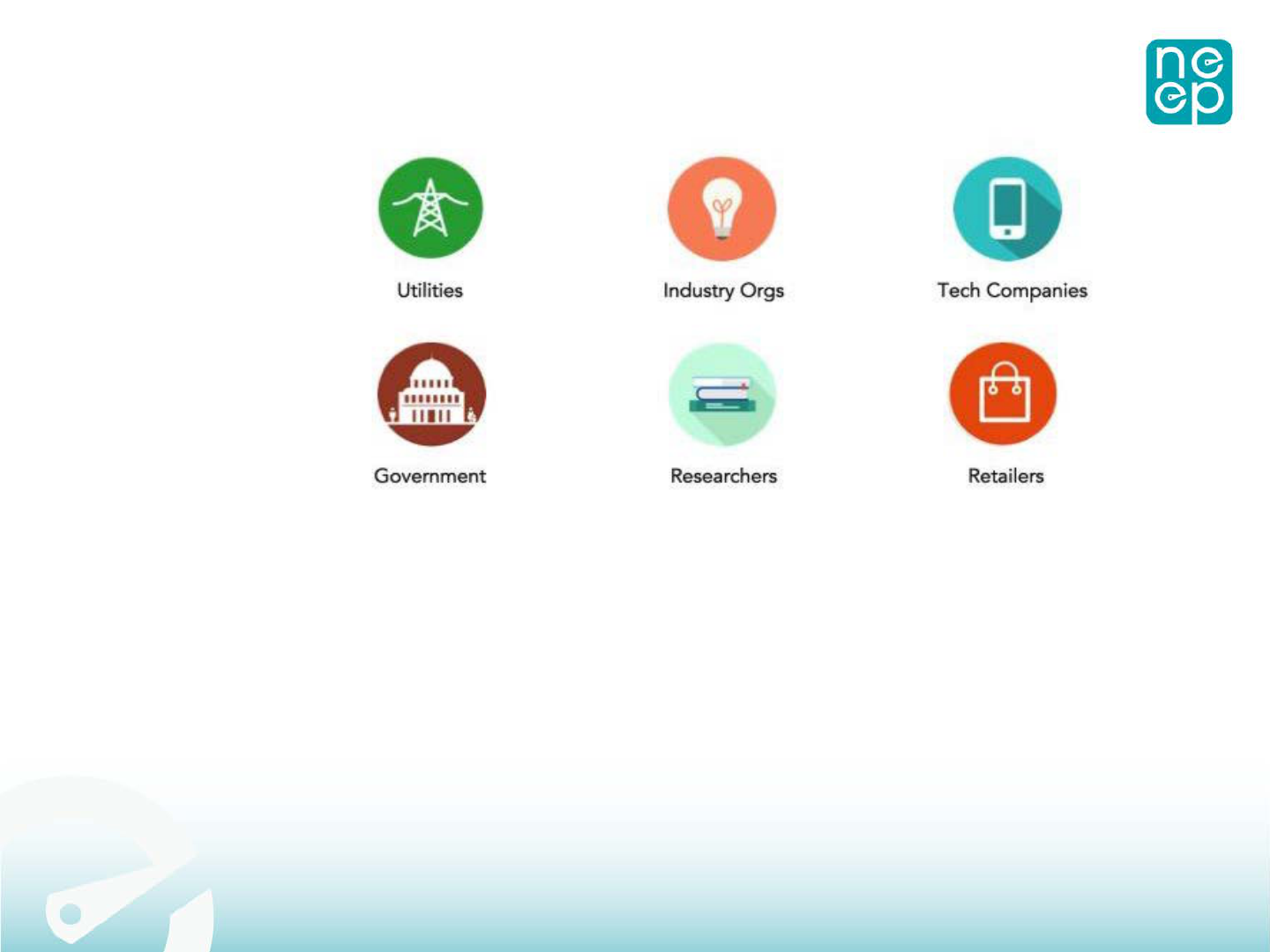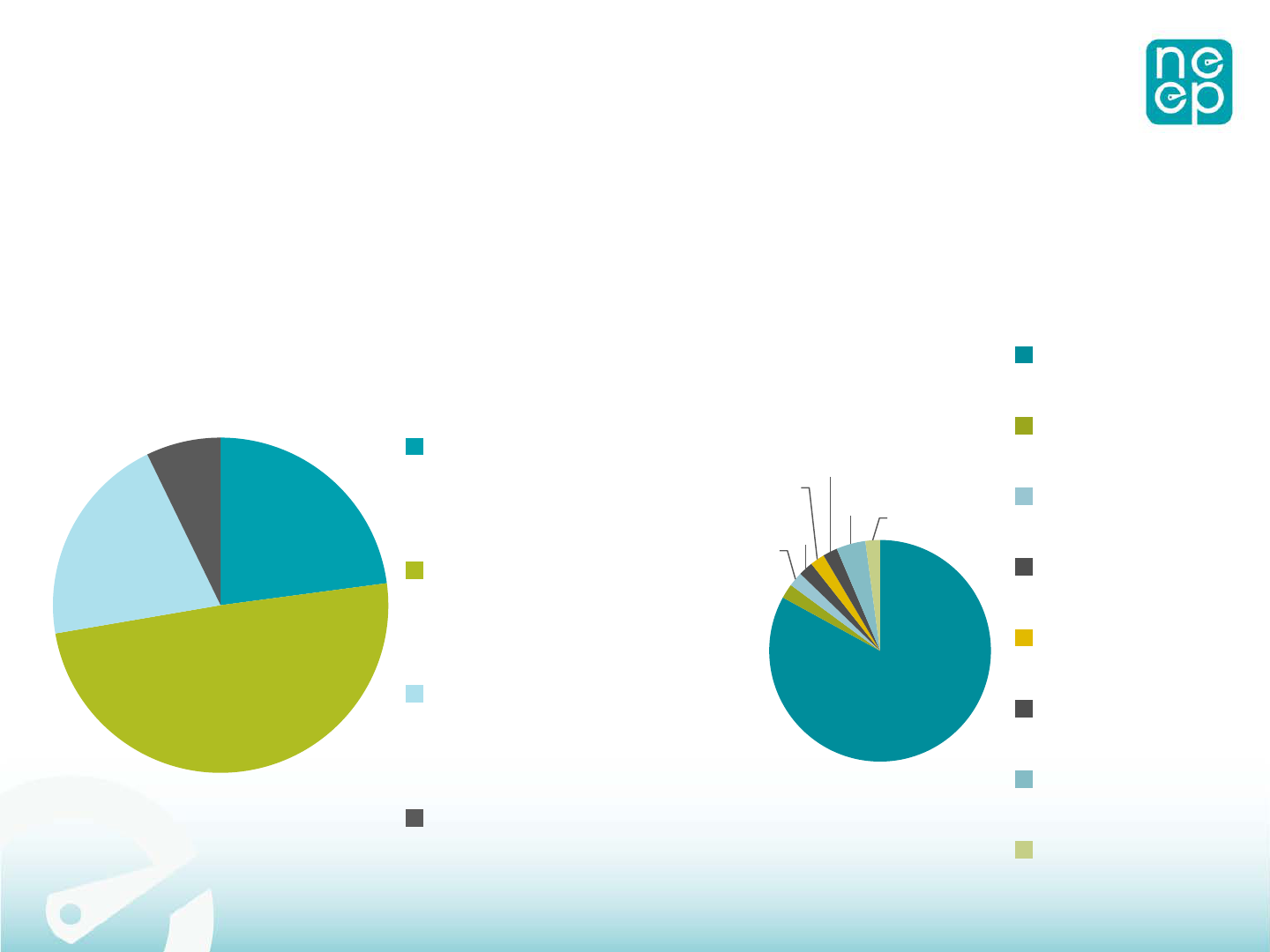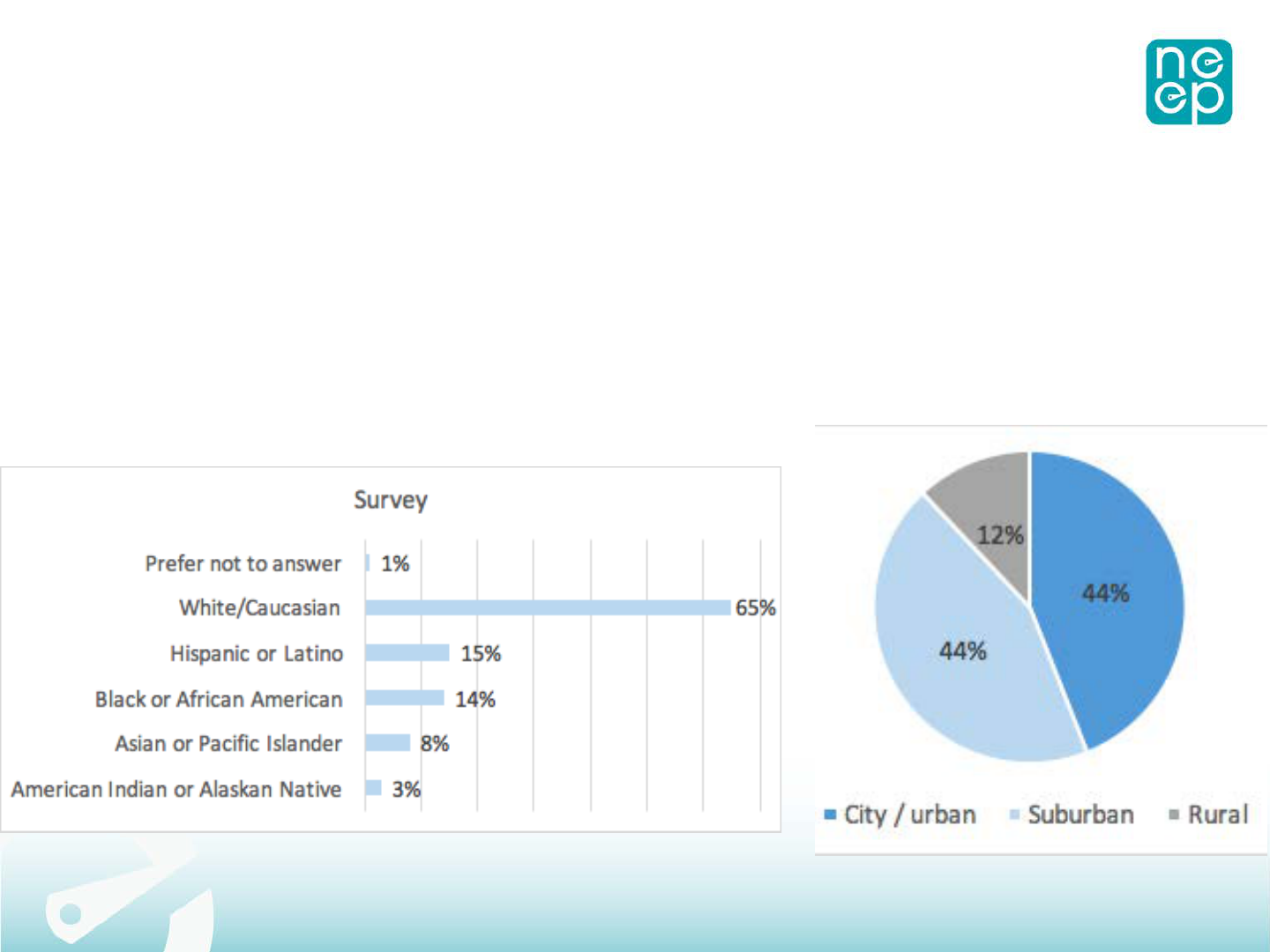
New York Smart Thermostat
Market Characterization
Delivered to: New York State Energy Research and
Development Authority
Authors: Northeast Energy Efficiency Partnerships and
SEE Change Institute
October 2016

About NEEP
Mission
Accelerate energy efficiency as an essential part
of demand-side solutions that enable a
sustainable regional energy system
Approach
Overcome barriers and transform markets via
Collaboration, Education and Enterprise
Vision
Region embraces next generation energy
efficiency as a core strategy to meet energy
needs in a carbon-constrained world
One of six regional energy efficiency organizations (REEOs) funded by the US Department of
Energy (US DOE) to link regions to US DOE guidance, products and programs
1

About SEE Change Institute
• See Change Institute blends social science with
innovative design to address global issues through
human solutions.
– We bring together leading academics and practitioners to
work on strategy, implementation, research, and
evaluation of behavior-based energy programs.
– Backed by theory, tested with data, and designed with
care, we develop, implement, and evaluate programs to
solve the issues that matter to us the most.
2

Summary of Contents
• Introduction
• The Smart Thermostat Market
• New York Market: Smart Thermostat Baseline and
Consumer Survey
• Barriers and Opportunities for Wider Smart
Thermostat Adoption in New York
• Interventions, Recommendations, and Potential
Impacts
• Conclusion
3

Introduction
• The goals of this characterization are to:
– Assess customer knowledge, attitudes, and actions toward
smart thermostats
– Analyze various stakeholder perspectives on the industry
and market potential
– Estimate the current baseline of smart thermostat
penetration in New York State
– Determine the size and scope of the opportunity for
NYSERDA to advance this market
4

Introduction Cont.
• The findings are intended to help NYSERDA identify
opportunities and challenges in this market to
determine appropriate interventions and ultimately,
market transformation
• Much of the data presented is specific to New York,
findings have implications for other markets
throughout the United States and world
• This presentation is a companion to the full report
which includes all citations and further explanations
of findings
5

The Smart Thermostat Market
6

Market Confusion in Terminology
“Wi-Fi”
“smart”
“programmable”
“learning”
“connected”
7

Technology overview
Terminology Description
Programmable
Thermostat
A thermostat connected to a home’s HVAC system that can be
programmed by a user or technician to follow a schedule based
on the lifestyle of the user.
Connected or
Wi-Fi
thermostat
A thermostat that is connected to the Internet and typically
includes a user interface, such as a mobile app or online
dashboard, for the user to remotely make changes. Connected
or Wi-Fi thermostats do not necessarily have any advanced
features, though any smart thermostat could also be considered
a connected thermostat.
Smart or
learning
thermostat
A connected thermostat that employs advanced algorithms
and/or sensors to improve user comfort, control, and energy
use. This may include occupancy sensing, geofencing, or
learning behavior.
8

Brands and Products
Navigant's
Smart
Thermostat
Leaders from
Leaderboard
Report, 2016
9

Most Cited Smart Thermostats
ecobee
Est. 2008
Nest
Est. 2011
10

National Smart Thermostat Market Size
Parks
Associates
2015 Smart
Thermostat
Units Sold
and
Projections
11

Size of Thermostat Market
• Smart thermostats are growing in proportion of the
overall thermostat market
– From 40% in 2015 to 50% in 2017 according to Parks
Associates
• Entire thermostats market is growing
– Fueled by early replacement of operational thermostats
with smart thermostats
– From 10 million in 2015 to 12 million in 2017 according to
Parks Associates
12

Product Costs
Manufacturer Model Equipment Cost
Allure EverSense $210.00
ecobee ecobee3 $249.00
ecobee ecobee3 lite* $169.00*
Honeywell Lyric Round $199.00
Honeywell Lyric T5 $149.99
Nest Nest Learning
Thermostat (3rd Gen)
$249.00
RCS 001-01773 $164.29
Schneider Electric Wiser Air $229.98
Venstar Voyager $145.00
*Product not yet available
13

Size of Smart Thermostat Market
• Assuming a weighed average of $210
– Based on presumed popularity of more expensive Nest
and ecobee
• Assuming from Parks Associates 5 million smart
thermostats sold in the U.S. in 2016
$210 x 5M = $1.05Billion
• Calculated $1.05 billion in sales in 2016 in U.S.
14

ENERGY STAR® Connected Thermostat
Specification
• Programmable thermostat program sunset in 2009
• Connected thermostat specification under
development
– expected to be finalized in early 2017
• Provides a common baseline, manufacturers to
report data every 6 months to stay on the list
• Proposed savings thresholds are 8% for heating,
10% for cooling
• Once final, NEEP Recommends NYSERDA only
promote products that earn ENERGY STAR
Certification
15

Potential Energy Savings from Smart
Thermostats
• Fraunhofer Savings Potential of Smart Thermostats
by Climate Zone for Very cold/cold and Mixed-humid
Climate
Zones that
occur in
New York
Heating Savings Cooling Savings
Percentage of
total household
energy use
MMBtu
equivalent per
household
Percentage of
total household
energy use
kWh per
household
Very
cold/cold
15% 9.1 20% 119
Mixed-
humid
15% 5.7 20% 381
16

Ranges of Reported Savings from Smart
Thermostats
17
• Fraunhofer:
– 15% heating, 20% cooling
• NEEP 2015 (compiled from several evaluations):
– 1-15% heating, 1-17% cooling
• ENERGY STAR’s proposed levels in Draft 3
Specification
– 8% heating, 10% cooling

New York Savings Potential from Smart
Thermostats
• From EIA’s 2009 RECS Data:
– 53% of New York households used individual window/wall air
conditioning units
– another 20% have a central air conditioning system
– air conditioning represents 1% of household energy use
– natural gas provides space heating for 57% of New York
households
– fuel oil provides 29% of space heating
– space heating makes up 56% of total energy use
• When all energy sources are combined, the average New
York household consumes the equivalent of 103 mmBtu
per year
18

New York Savings Potential from Smart
Thermostats Cont.
• Potential heating savings:
– Using Fraunhofer’s 15% potential savings from heating,
smart thermostats could offer up to 8.7 MMBtus per
household per year average heating energy savings.
• Potential cooling savings:
– Only 20% have central AC which is best candidate for smart
thermostat control
– Using Fraunhofer’s 20% potential savings from cooling, the
cooling potential savings about 30 kWh/year per
household
19

Market Actors
Market Actor Description Examples
Hardware
Manufacturer
These companies produce smart thermostats. Some are relatively
new companies focused on smart thermostats. Others are traditional
thermostat manufacturers who have expanded their products.
New: Nest, ecobee, tado, Quby
Traditional: Honeywell, Schneider
Electric, Emerson, Carrier, Trane
Software
Vendor
These companies partner with thermostat hardware manufacturers to
provide the advance algorithms that move a product from connected
to smart.
EnergyHub, EcoFactor,
Weatherbug, Energate
E-tail Online retailers and online manufacturer stores on their website for
direct to customer online sales.
Amazon, newegg, manufacturer
online stores
Brick and
Mortar Retail
Retailers with a history of selling thermostats have an extension of
their existing sales. Consumer electronics retailers have also entered
this market
Lowes, Home Depot, Best Buy,
Target, Sears, Apple Store,
independent retailers
HVAC
Distribution
Channels
Manufacturers with a traditional base in HVAC, smart thermostat are
an addition to the suite of offerings through distributors and
installers. Newer manufacturers have also sought out HVAC
distribution and installation.
HVAC distributors, HVAC installers
Security and
Telco Service
Providers
Many security and telecommunications service providers have started
offering smart thermostats as part of their bundle of offerings.
ADT, Alarm.com, Comcast, AT&T
Home
Performance
Contractors
Several manufacturers offer training and tools to aid in the sale and
installation of their products for contractors. Few focus on this
channel for sales
Home Performance Contractors
20

Smart Thermostat Product Journey
From Parks Associates, 2015 and 2016
21

Sales Channels for Smart Thermostats
22

Industry Actor Interviews and Key
Findings
• SEE Change conducted semi-structured interviews with
32 key HEMS players from six stakeholder groups
• An additional 15 HEMS industry stakeholder responded
to an online survey with similar questions
• Findings used to inform analysis
23

Stakeholder Survey Responses on
Important Features for HEMS Adoption
24

New York Contractor Survey and Key
Findings
• Home performance contractors identified as major channel
• Survey: 83 respondents throughout NY
0%
10%
20%
30%
40%
50%
60%
70%
80%
90%
Energy
Audits
Insulation
Air Sealing
HVAC
Upgrades
Window
replacement
General
home
improveme…
Solar panel
installation
Construction
Consulting
Please indicate what work your company performs in the residential space.
25

Contractor Smart Home Awareness
• Only 1 contractor not aware of “smart home”
0 10 20 30 40 50
Smart appliance
Smart thermostat
Smart lighting
Smart plug
Number of Respondents
How familiar are you with each of the following smart
home technologies?
Very
Somewhat
A little
Not at all
26

Are Customers Asking About it?
• Somewhat…
23%
49%
21%
7%
Do your customers ask you about
smart home technologies?
No, it's never come up
Yes, it's been brought
up once or twice
Yes, it's been
mentioned in a fair
number of jobs
Yes, it comes up
frequently
83%
2%
2%
2%
2%
2%
5%
2%
If yes, which ones
Smart
Thermostat
New custom
contruction
Renewables
Smart appliance
IAQ monitoring
Water Leads
Lighting
Smart switch
27

Contractor Opinions of Smart Thermostats
0 50 100
4. I feel smart thermostats are
helpful to save energy for my
customers
3. I own a smart thermostat
myself (or would like to)
2. I feel smart thermostats are
overrated
1. If a customer wants a smart
thermostat, I try to talk them
out of it
Number of Respondents
Strongly
agree
Somewhat
agree
Neutral
Somewhat
disagree
Strongly
disagree
28

Contractor Survey Conclusion
• Relatively high awareness and some experience with
smart thermostats
• Some skepticism, but not overwhelming
• Value proposition for incorporating smart thermostat
promotion into their work is not yet clear
• Potential for intervention on all components
29

NY Market: Smart Thermostat Baseline
and Consumer Survey*
30
*See survey instruments, available as companion documents to this report, posted on NYSERDA’s website.

NY Smart Thermostat Penetration
Baseline
• Reviewed available national
data
• NY Resident survey of 538
• Long Island subset of 118
• Results of similar survey in CA
• NEEP recommends a 13 to
17% range as the baseline for
New York penetration of
smart thermostats
– with the preponderance of
evidence pointing to the 14%-
15% penetration
Source Rate
Parks Associates
Extrapolated to NY
12.4%
Sylvania Socket Survey 13%
NY Resident Survey
Low
8.9%
NY Resident Survey
High
17%
PSEG-LI Subset of NY
Residential Survey
15.3%
PG&E Survey 14%
31

NY Customer Survey Analysis
• Participants: 538 New Yorkers
– 35% from NYC
– 10% from Buffalo, Rochester, Yonkers, and Syracuse
– 55% from rest of state
Age:
32

NY Customer Survey Analysis Cont.
• Large range of incomes:
– 30% <$50,000
– 36% $50,000-$100,000
– 19% $100,000-$175,000
– 8% >$175,000
Race/Ethnicity Self-identified community
33

Survey Question Structure and Content
• Smart home technology awareness:
– How aware are survey respondents of smart home
technologies and the smart home market?
• Smart home technology attitudes:
– How do survey respondents feel about smart home
technology, in general and in their own personal use and
ownership?
• Smart home technology actions:
– Do survey respondents own smart technology? How would
(or do) respondents like to interact with and use their
smart technology?
34

Results: Awareness
• Relatively high level of awareness of the notion of a “smart home”
– Nearly 90% of respondents were at least a little familiar with “smart homes”
– 62% of respondents said that they were either “very” or “somewhat” familiar with “smart
homes”
– >50% respondents were either “somewhat” or “very” familiar with smart appliances, smart
lights, and smart thermostats
– 40% of respondents were not at all familiar with smart plugs
– People were significantly more aware of smart thermostats relative to smart plugs and smart
appliances (p < 0.01).
Where did you learn about smart home products?
Media 63%
Store 36%
Word of mouth 36%
Service provider 18%
Not sure 13%
Other 2%
• Work (4)
• Internet (3)
• Advertising (2)
• Engineering magazines (1)
35

Purchase Location for Smart Devices
• For those who owned at least one smart devices, they got them from:
Smart
appliances
Smart
lights
Smart
plugs
Smart thermostat
Store 14% 4% 10% 10%
Online 12% 11% 10% 12%
Gift 5% 14% 4% 3%
Borrowed <1% 2% 2% 1%
Came with my
home
2% 2% 2% 2%
None of these,
not sure
<1% 0% <1% 1%
Other 0% 0% 0% 2%
Installed with HVAC
Installed by ConEd
36

Smart thermostat Owners: Feedback
• Overwhelmingly positive
Control /
Features
0%
General
“positive”
comments
52%
Everything
17%
Ease /
Convenience
/ Comfort
16%
Nothing /
Don’t know
4%
Brand
3%
Money
savings
4%
Other
4%
What (if anything) do you LIKE about your smart
thermostat?
Nothing /
Not sure
61%
General
“good”
comments
21%
Interopera
bility /
Connectivi
ty issues
3%
Features
3%
Size
3%
Other
9%
What (if anything) do you DISLIKE about your
smart thermostat?
37

Smart Thermostats and Demographics
• Smart Thermostat Owners:
– Men were twice as likely as women to own
– Younger people, wealthier people, and Caucasians were all more
likely to own
– People in urban as opposed to rural or suburban locales were
more likely to own
• In stand alone homes:
– renters were disproportionately less likely to own
– home owners disproportionately more likely to own
• Apartment dwellers (renters or homeowners):
– significantly less likely to own smart thermostats
• Smart thermostat owners did not differ from non-owners
in terms of how long they expect to stay in their homes
– counterintuitively, found a marginally significant correlation (p =
0.06) that people who own smart thermostats actually expect to
stay a shorter time in their home.
38

Smart Thermostat Owner Actions and
Attitudes
• Smart thermostat owners did not perceive more smart home benefits
than those without smart thermostats
– No significant difference in the appeal of comfort-related benefits for owners or
non-owners
– Owners found all other smart products more appealing
– Owners were more likely to own other smart devices
– Owners are significantly more likely to also own solar panels and/or electric
vehicles
• 51% of smart thermostat owners also owned solar panels.
• Smart thermostat owners have significantly weaker personal norms, and
significantly stronger social norms about conservation
– Perhaps owners employ “moral licensing,”
• the action of owning one type of “green” technology makes someone think that their neighbors
are trying to conserve and that their community expect them to conserve
– Owner weaker personal norms suggests owners do not personally feel responsible
for conserving energy, as if they feel they have sufficiently “done their part” for
conservation
– This effect was found to be independent of gender, ethnicity, age, and income
39

Miscellaneous Findings and Questions
• A preliminary area for further exploration was the
urban/suburban/rural ownership divide
– Hypothesized that urban households may own more smart thermostats
due to a higher exposure to media, but found urban, suburban, and rural
households do not significantly differ in terms of learning about smart
technology from media
• All reported a high level of learning about smart technology from the media.
• When controlled for personal and social norms:
– Found that most of the urban dominance of owning smart thermostats
over the suburbs disappeared; the difference between urban and rural
homes persisted but was drastically reduced
– Suggests attitudes towards energy use, particularly, personal and social
norms regarding conservation, explain the urban/suburban/rural divide of
smart thermostat ownership.
– People in urban areas were found to hold weaker personal and stronger
social norms for conservation, both of which were associated with greater
smart thermostat ownership.
40

Barriers and Opportunities for Wider
Smart Thermostat Adoption in New York
41

Barriers to Widespread Adoption
“Difficult setup, poor interoperability, difficulty in
support, lack of strong value proposition to consumers,
and lack of ability to control and deploy the systems by
the service provider”
-Stakeholder interview
42

Barriers Ranking for Contractors
0
10
20
30
40
50
60
70
80
90
Customers are not aware
Too expensive
The devices/systems don't
work well together
(interoperability)
Value proposition is
unclear--don't seem worth
it
Security risks
Data sharing
Devices are not easy to use
Number of Responses
Please rate the significance of the following barriers to smart home adoption.
Very
significant
Somewhat
significant
Not
significant
Not sure
43

Analyzed Barriers
• Demonstrated Savings:
– Range of savings demonstrated from pilot efforts
• High Cost:
– Difficult sell to consumers who don’t see full value
– Price prohibitive for a large segment of the population
• Consumer Interest & Engagement in Energy Savings:
– While popular relative to the rest of the HEMS ecosystem, most
consumers are not engaging with smart devices from a primarily
energy savings perspective
– Adoption alone may not be enough to drive energy savings;
consumers need further engagement with their smart thermostats to
yield significant savings
• Data Sharing:
– Utilities and program administrators are concerned about liability and
data validation
– Industry is concerned about reputation and customer protection
44

Analyzed Barriers Cont.
• Interoperability
– customer confusion from multiple platforms, apps, and brands, which
may be challenging for persistence. Some popular platforms are
emerging to work with multiple systems and help improve this.
– For smart thermostats, companies continue to build partnerships with
other platforms; the challenge of interoperability seems to be
diminishing
• Singular Focus on Products not Systems:
– Concerns arose about a “singular focus” on one smart home product
offering, in most cases the smart thermostat, and the potential for this
siloed perspective to affect engagement with the energy management
systems
– Perhaps shifting program administrators role to be “unbiased advisor
and integrator…where customers can shop for a plumber, shop for
solar, get an EV charging station installed, or get a connected home set
up….a holistic solution to needs that customers would have in their
homes”
45

Analyzed Barriers (Cont.)
• Customer awareness:
– While customers are more aware of smart thermostats than they are
of other smart home products, general awareness is quite low
– Results from NY customer survey:
0%
5%
10%
15%
20%
25%
30%
35%
40%
45%
The concept of
“smart home”
Smart appliance Smart lights Smart thermostats Smart plugs
How familiar are you with the following?
Not at all
A little
Somewhat
Very
46

Opportunities
• Smart Thermostats can serve as Gateway product to the
smart home
:
– Smart thermostats could act as a gateway product to catalyze
consumer awareness and adoption of products across the larger
smart home ecosystem
• Demand Side Management:
– Because of the control functionalities smart thermostats
provide for both consumers and third parties, there is significant
demand response potential
• New Opportunities for Measurement and Verification:
– Smart thermostats have the potential to provide new ways of
measuring and verifying the actual savings data of households
– Analysis of the data stream is an opportunity to understand the
actual control behavior of the smart thermostat
47

Interventions, Recommendations, and
Potential Impact
48

Interventions and Recommendations
• Consumer Education and awareness:
– This report found gaps in consumer education and awareness of smart
thermostats.
– According to industry stakeholders, the desire to align educational
efforts exists
– Opportunities to capitalize on the various sources of awareness for
smart home technologies, particularly media
• Home Performance Network as Smart Thermostat
Ambassadors:
– Opportunity to partner and push home performance contractors to
bring smart thermostat technology to customers
– Contractor education is necessary first step to ensure that they
understand the benefits of smart thermostats and are willing to
support them
– Through contractor outreach and training, smart thermostat could
become another tool, along with air sealing, insulation, windows, and
more, in the home performance upgrade package
49

Interventions and Recommendations Cont.
• Efficiency Program activity:
– In addition to the other recommendations listed here, rebates and incentives were
the most commonly cited pathway for engaging customers
– Bring-Your-Own-Thermostat programs, were a popular recommendation among
surveyed stakeholders, as it combines customer choice with access to utility
programs
– BYOT minimizes some of the risk of product selection before the ENERGY STAR
Connected Thermostat specification is complete, however once that specification
is final, promoting products that meet the ENERGY STAR recognition is
recommended.
• Bundling and Partnerships:
– Opportunity to bundle products and services together to ease customers into the
market while educating and engaging them in a broader range of energy
management products
– Potential to design behavior based incentives, or “gamification,” to regularly
engage customers with their energy usage as well as drive more sustainable
behavioral changes
– Because many smart home players are new to the efficiency space, there are
opportunities to create unique partnerships to inform and drive the market,
especially with less-traditional stakeholders such as the home security and
telecommunications providers, who are not as focusing on the energy benefits of
smart thermostats, but are a significant player in the market
50

Interventions and Recommendations (Cont.)
• Targeting consumers:
– The customer survey found strong correlations on ownership of
smart thermostats, particularly that urbanites and men were
much more likely to own a smart thermostat than suburbanites
or women
– Armed with that information, smart thermostat education and
promotion should evolve beyond blanket marketing
• Evaluation of Smart Thermostats:
– ENERGY STAR’s work is promising in terms of addressing
measurement, verification, and standardization obstacles
– NYSERDA has the opportunity, through a market transformation
lens, to bring new methods for evaluation of smart thermostat
savings to the fore, as outlined in NEEP’s 2016 Smart Energy
Home Report
– This could have impacts for both how New York claims savings,
as well as implications for the entire country’s evaluation
framework
51

Tracking Success
• Key data sources to track:
– Sales, measured through manufacturer or retailer provided
data when available, (or shipping data through ENERGY
STAR once Connected Thermostats specification is final)
– Penetration, measured through on-site evaluations,
provided from retailers, customer surveys
– Resident awareness, tracked through surveys, media hits,
social media
– Contractor awareness, tracked through surveys, inclusion
in conference agendas, media
52

Conclusion
53

Concluding Thoughts
• Penetration of smart thermostats in New York between
13% and 17%
– over 80% of New York homes do not have a smart thermostat
• Energy savings potential for both heating and
increasingly for cooling in across NY is incredible
– Potential savings of over 217 million kWh for cooling
– 63 Million mmBtus equivalent for heating
• Many opportunity for intervention
– target consumers, partner with contractors, build partnerships,
education, engaging consumers
• Report findings can be extrapolated beyond New York
54

